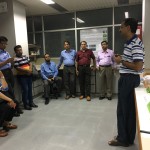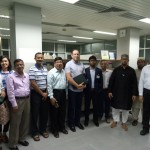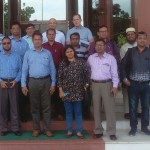Author:
Rituparna M., Sathguru Management Consultants
Bangladesh is the first country in South Asia to commercialize a genetically modified food crop – Bt eggplant. Bangladesh granted approval for the release of four varieties of Bt eggplant on October 30, 2013. The number of farmers cultivating Bt brinjal in Bangladesh has risen from 20 to 108 to 250 to 5512 from 2014 to 2016 — a clear indication of the benefits of Bt technology in controlling the fruit and shoot borer and growers’ positive experience with the improved varieties. Bangladesh is planning to release other genetically modified crops currently in the advanced stages of research, including Late Blight Resistant Potato and Golden Rice.
With agrarian models undergoing a paradigm shift in Bangladesh, it is imperative that researchers, academics, seed production experts, extension professionals as well as farmers are appraised about the effective stewardship of biotech crops both pre- and post-launch as key to sustainable production. In this regard, a training program on “Stewardship for Biotech Crops” for the researchers of the key biotech projects in Bangladesh was organized under the aegis of Feed the Future Biotechnology Partnership (FtFBP) South Asia Eggplant Improvement Program in partnership with Mahyco at Dawalwadi, Mahyco from September 8–9, 2017.
The objective of the training was to expose scientists to the concept of “Excellence through Stewardship” (ETS) as a life cycle approach to product management. Once exposed to the concept, researchers are expected to make conscious efforts toward quality management through structured systems and processes to establish stewardship and maintain quality in each phase of a product’s life cycle.
Twenty people associated with the development of the transgenics of these three crops attended the two-day training program, including scientists from the Bangladesh Agricultural Research Institute (BARI), the Bangladesh Rice Research Institute (BRRI), officials from the Bangladesh Agricultural Research Council (BARC) and representative from the Ministry of Agriculture, Bangladesh, as well as Bt brinjal project implementers from the Philippines.
stewardship-group.pngThe experts oriented participants on the importance of stewardship in maintaining the plant product integrity of genetically modified crops and what aspects needed to be taken care of at each stage of development. The various modules discussed involved: research in the laboratory, breeding for trait introgression in contained facilities, trait testing, quantification and purity, confined field trials, plant and seed multiplication, commercial plant and seed distribution, quality assurance, product launch stewardship and product discontinuation, incidence response management and resistance management. Experts also oriented the participants on Quantitative ELISA and PCR testing kits and the best practices adopted in Insect Resistance Management.
The participants also attended the 5th Annual South Asia Biosafety Conference at Bangalore, where they had the opportunity to interact with leading biotech researchers and regulators in South Asia. They had the opportunity to understand the regulatory processes adopted by neighboring nations and the latest advancements in crop biotechnology in the region. During the optional workshop on “Best Practices for Public Sector Genetically Engineered Product Development Programs,” the participants were appraised about the various case-by-case challenges faced by Indian researchers.
As an outcome of the program, participants are now encouraged to adopt a stewardship culture across their biotech projects. With all the stakeholders comprehensively appraised about the process, the teams will gear up to identify areas of improvement in the life cycle of their projects. The FtFBP South Asia Eggplant Improvement Program will further guide the researchers in developing a robust and customized stewardship process for strengthening existing quality management systems to achieve and maintain plant product integrity.
Source: bteggplant.cornell.edu


